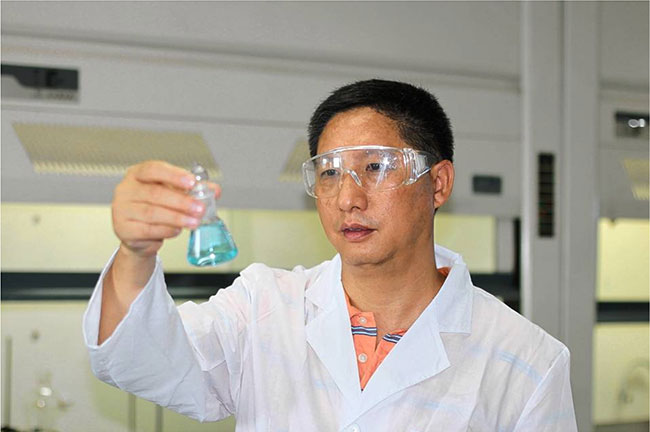The Wall Street Journal
After 14 yeasrs,Shenzhen biotech's medicine is one of the few locally developed from star finish

HONG KONG-Xian-Ping Lu Left his job as director of research at drug maker Galderma R&D in Princeton,N.J.,to co-found a biotech company to develop new medicines in his native China.
It took more than 14 years but the bet could be paying off.In February,Shenzhen Chipscreen Biosciences' first therapy,a medication for a rare type of lymph-node cancer,hit the market in China.
The willingness of veterans like Dr.Lu and others to leave multinational drug companies for Chinese startups reflects a growing optimism in the industry here.The goal,encouraged by the government,is to move the Chinese drug industry beyong generic medicines and drugs based on ones developed in the West.
A New Cancer Drug,Made in China-WSJ

ILLUSTRA TION:ADAM NIKLEWICZ
Chipscreen's drug,called chidamide,or Epidaza,was developed from start to finish in China.The medicine is the first of its kind approved for sale in China,and just the fourth in a new class globally. Dr.Lu estimates the research cost of chidamide was about $70 million,or about one-tenth what it would have cost to develop in the U.S.
“They are a good example of the potential for innovation in China," said Angus Cole,director at Monitor Deloitte and pharmaceuticals and biotechnology lead in China.
China's spending on pharmaceuticals is expected to top $107 billion in 2015,up from $26 billion in 2007,according to Deloitte China.It will become the world's second-largest drug market,after the U.S.,by 2020,according to an analysis published last year in the Journal of Pharmaceutical Policy and Practice.
China has on-the-ground infrastructure labs,a critical mass of leading scientists and interested investors,according to Franck Le Deu,head of consultancy McKinsey & Co.'s pharmaceuticals and medical-products practice in China."There're all the elements for the recipe for potential in China," he said.
RELATED COVERAGE
But there are obstacles to an industry where companies want big payoffs for a decade or more of work and tremendous costs it takes to develop a drug.
While the protection of intellectual property has improved, China's cumbersome rules for drug approval and a government effort to cut health-care costs, particularly spending on drugs,could hurt the Chinese drug companies' efforts, said Mr. Cole of Deloitte.
"Will you start to see success? Of course you will," said Mr.Cole.However,"I've yet to see convincing or compelling evidence that it's imminent."
To date, many of the Chinese companies that are flourishing in the life sciences are contract research organizations that help carry out clinical trials, as well as providers of related services.
Some companies,like Shanghai-based Hua Medicine,are buying the rights to develop new compounds in China from multinational drug companies,what some experts consider more akin to an intermediate step to innovation.
Late last year,Hua Medicine completed an early-stage human clinical trial of a diabetes drug in China and in March filed an application to the Food and Drug Administration to develop it in the U.S. as well. The company has raised $45 million in venture funding to date.
Li Chen, who left an l8-year career at Roche Holding AG as head of researech and development in China to help star Hua Medicine,said the company's goal is to "create a game-changer of drugd discovery."
At Chipscreen Biosciences,Dr.Lu and his co-founders set up the company in 2001 in Shenzhen, a city that was quickly growing into a technology and research hub,just over the border from Hong Kong.They created a lab of 10 scientists to use a new analytic technique known as "chemical genomics" to examine the relationships between molecular structures of the existing and failed drugs,how they act on different targets in the body and what genes were being activated or repressed.Now they have more than 60 scientists.
By better predicting how chemicals would act on the body before entering human testing,they hoped they would be more likely get a drug to market.
"How can a smallcompany compete with a multinational?" said Dr.Lu."The only thing We can combete with is the scientific brain."
The biggcest challenges for the company have been financing and the Chinese regulatory system, said Dr.Lu. The company has raised a total of 300 million yuan($48 million) over five rounds of venture funding said Dr.Lu. Chipscreen also receives grant money from the Chinese government.
The company filed its application for approval of chidamide to the Chinese Food and Drug Administration,or CFDA in early 2013 .It had to wait nearly two years for approval,receiving the OK only in December.
Chidamide now is on the market in China for 26,500 yuan($4,275)a month,a price far lower than patients in the U.S.pay for some of the newest cancer medicines but much more than the typrical Chinese patient pays for drugs.Dr.Lu said the price reflects a balance between affordability for patients and return for shareholders.Some investors wanted to price the drug higher.
Write to Shirley S.Wang at shirley.Wang@wsj.comThe Wall Street Journal
2015.05.22
2015.05.23
2015.05.24